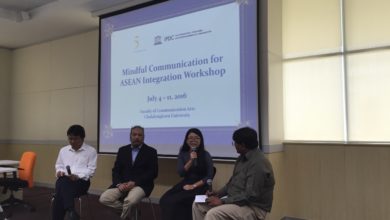Burma in the Throes of Change – Part 1
Preethi Nallu
CHIANG MAI, Thailand, Feb 6 (IPS) – Moves by the Burmese government to settle ethnic conflicts in the country,
notably with the Karens in the mountainous eastern part of the country, have caught critics of the regime by surprise.
When the government and the Karen National Union (KNU) signed a ceasefire agreement on Jan. 12 aimed at ending the 62-year-old Karen insurgency – the world’s oldest running ethnic conflict – there was scepticism as to whether the powerful Burmese military would honour conditions laid down by the rebels.
The KNU had outlined “trust building through dialogue, discussion and pulling out/reduction of government troops” and “collaboration with other ethnic national nationality forces at the stage of political dialogue and negotiation” as key demands.
“There are still no guarantees, but the fact that they (government) are addressing the problems is a shock and positive surprise in itself,” explains Kim Jolliffe, a research consultant specialising in conflict and displacement.
Jolliffe said the situation remains relatively stable and the parties are keen to uphold the conditions laid down at the January talks between the KNU and the pro-reform government of President Thein Sein.
“The KNU has ‘welcomed’ the government’s acceptance of its 11-point proposal and says it will continue ‘concrete discussions’ on how the terms and conditions will ‘materialise on the ground’ before both sides can agree on a final agreement,” Jolliffe elaborated.
Through its militant wing, the Karen National Liberation Army, the KNU has been fighting successive governments to secure independence or greater autonomy for the Karen state since 1949, a year after Burma gained independence from British colonial rule.
Burma’s military, which ruled the country, responded with harsh repressive measures that included systematic rape, evictions, forced labour, torture and murder that prompted two decades of sanctions by the European Union and the United States.
Officials acknowledge that it will take a cumbersome process before ‘everlasting peace’ can be achieved in a region riddled by conflict for over six decades.
At a press conference in Rangoon (also Yangon) before the ceasefire talks, Aung Thung, minister for industry
and head of the government’s negotiating group, estimated that “it will take up to three years to reach peace
agreements with all armed ethnic groups.” An agreement has also been reached with rebels of the Shan State Army that seeks to establish an autonomous Shan state in the southern part of the country.
Talks with the Kachin Independence Army (KIA) have, however, been derailed by fighting, despite orders last month by the President to end military operations in the northern Kachin state that shares a long border with China.
According to the New York-based Human Rights Watch (HRW), the number of civilians displaced in the Kachin state has risen over 50,000 in the fighting that erupted in June 2011, ending a 17-year ceasefire between the KIA and the Burmese military.
The rebels distrust Thein Sein’s government, comprising people drawn from the old junta that allegedly rigged the 2010 elections in favour of the military-backed Union Solidarity and Development Party. On the other hand, the rebels support Nobel peace laureate and pro-democracy leader Aung San Suu Kyi’s vision of a federal structure for Burma.
Despite the fragility of the situation activists such as Aung Naing Oo, director of the Vahu Development Institute, Chiang Mai University, feel that enough momentum has been generated over the last few months in the direction of peace with a new perspective.
“It is not only because of the new government’s policy, but also prevailing conditions such as general political progress, release of political prisoners, improved international relationships and, above all, greater political space,” explains Aung Naing Oo, leader of a failed student-led uprising in 1988 that left 3,000 people dead.
A positive effect of the ceasefire talks is that the army is no longer resorting to intimidation tactics such as forced displacement, burning down of villages, rape and summary shootings.
But pitfalls lie ahead. Disagreements between the government and the KNU could stem over economic development plans, mostly around the exploitation of the rich natural resources that are attractive to foreign investors.
Jolliffe says the Karen will stake a claim to “become key economic stakeholders in order to maintain relevance in a modern political environment and continue making demands on behalf of the people they aim to represent.”
Troops have, in the past, driven away hundreds of thousands of Karens from their villages, many into camps in neighbouring Thailand, which has struggled to cope with the flood of refugees. The ceasefire agreement says efforts would be made to resettle and rehabilitate displaced people.
“Most important of all, I think we need a new roadmap for reconciliation with armed ethnic groups because we have to create a proper and comprehensive peace process,” says Aung Naing Oo.
According to HRW, there was no decrease in human rights violations during 2011. “The Burmese military continues to violate international humanitarian law through the use of extrajudicial killings, torture, sexual violence, beatings, abusive forced labour, antipersonnel landmines, and pillaging of property, particularly in Kachin, Shan, and Karen states,” says a January press release from HRW.
Khin Ohmar, of the Thailand-based Burma Partnership, believes that the international community should maintain pressure on the regime to “put an end to attacks on ethnic communities” and keep this as a “key benchmark while considering lifting of sanctions.”
While the ceasefire between the Karen and the Burmese military was followed by the release of about 300 political prisoners on Jan. 13, many of them high-profile dissidents or political leaders, Ohmar is sceptical about any role they can play in planned elections.
“Given that laws prohibiting free expression remain in place, speaking out against the regime could lead to a return to prison,” she said.
Former Burmese army captain Nay Myo Zin, arrested under the infamous Electronics Act, introduced last year to curb Internet freedom and released during the January amnesty, was re-arrested within two weeks.
*This is the first of a two-part series on Burma’s transition from decades of dictatorship.


